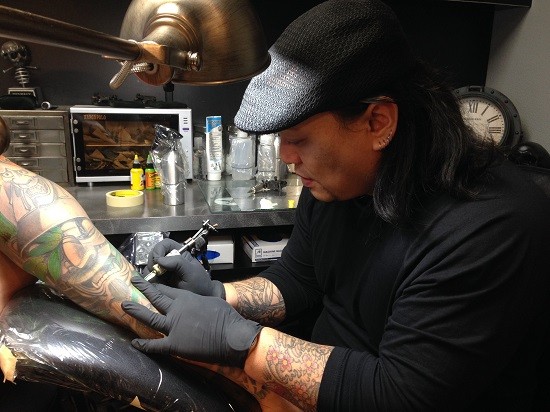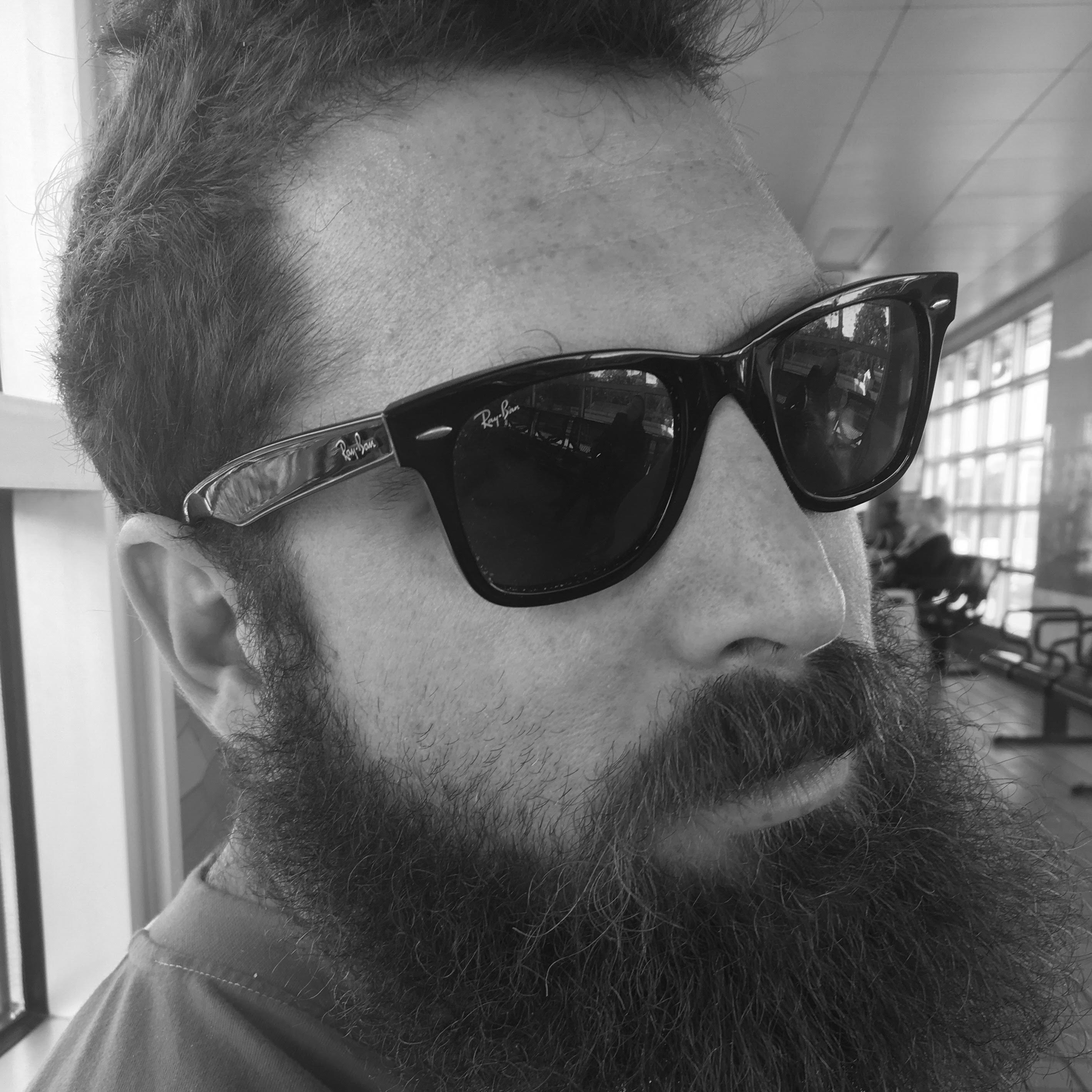
Upon entering My Tattoo in Huntington Beach, you're immediately greeted by dozens of major awards owner Jess Yen has won. When you've been inking people for well over two decades and are generally considered to be one of the best tattooers on the planet, it's only natural to pick up some accolades along the way.
But Yen would rather talk about the other guys at the shop, the other members of his tattooing “family.”
]
See also: JJ Sawyer of Players Club Tattoo Parlor on Traveling Through Europe and Tattooing Siblings
“Our shops are run by people from my family system, so I'm the only one who can train those guys,” Yen says. “I don't trust people from outside of the shop, everyone has an ego or too much pride. I'm very selective of who works here, and that's guys like Andre (Rennard) and Damien (Ornelas). They survive here because they have the same patience and dedication that I have.”
The patience and dedication Yen is referring to would likely cause a lot of grief in normal street shops, but it's encouraged at My Tattoo. Yen won't tattoo someone if he's not entirely pleased with how the design came out. If the 42-year-old spends several hours drawing up the stencil for a full sleeve only to have it not look quite right when placed on the skin, he'll ask the customer to come back another day while he redraws the tattoo, often costing himself up to $2000 in a single day.
While Rennard, Ornelas and Andy Tran, the shop's manager, all share that common goal of perfection with Yen, they're also far more accessible than the owner. If you want to get tattooed by the world's most accomplished “illustrative realism Oriental” tattoo artist, you'll likely be waiting somewhere between 4 years and a decade. The three other artists often have near-immediate openings, each with a style of their own.
“Unlike some shops that will turn you down if you only want a small tattoo, my guys will do just about everything,” Yen says. “Andre does very good Americana (traditional), and Damien does all custom work, and it's all super clean. He can do almost anything you ask for. Andy is my student, so he does realism and Oriental tattooing.”
It's that realistic Oriental (not Japanese, as Yen's tattoo style is much like his ethnicity, a wide variety of Asian influences) style of tattooing that has drawn so much acclaim for Yen. He keeps the flow, storytelling aspects and content from traditional Asian tattooing, but mixes in the details, shadows, and three-dimensional perspectives of more modern realism to appeal to a broader American audience.
“I started with Japanese traditional style work, but just doing that kind of work in America makes it hard to earn money,” says Yen, who grew up and started his tattooing career in Taipei. “It's like when McDonald's goes to Asia, they change the flavor. I came to America and changed my style.”
Yen didn't come to America to be a tattoo artist though, he moved to New York in 1997 to pursue his master's degree in interior design before realizing that winters in the northeast weren't his ideal climate. In March of 1998, he moved to SoCal, where he continued chasing his interior design dreams while drawing portraits on the Santa Monica boardwalk and tattooing on the side.
From there, Yen ran a shop in LA before opening up My Tattoo in Alhambra, and finally in Huntington Beach almost three years ago. Yen knew how many tattoo parlors already existed in HB, so he made sure to go about everything the right way when opening this one.
“There's a law that says there can only be five tattoo shops on Beach Boulevard, so I spent a lot of money to buy one that wasn't doing well, take everything out and design the whole thing myself,” Yen says. “I went with a more industrial look instead of Oriental, because I didn't want to be just an Oriental shop. There are so many great tattoo artists in OC, I want to be a part of the OC crew.”
[

How did you get into tattooing?
I started tattooing little kanji on my classmates in 1989. I was good at drawing, so I told them I could do it even though I didn't know much. It was OK, because they didn't know much either. I found a book with some of Horiyoshi III's tattoos in it, so I would trace those because the copier was too expensive. I used a bamboo needle and calligraphy ink, because that's what I had available. I did an apprenticeship under a guy who tattooed a lot of tough guys, and if you don't have anything to talk about with them, you're in danger walking down the street. I didn't have any older brothers and my father died, and they looked down on you if you didn't have an older man in your family. I tried to be cool with everyone, so I started tattooing some of them, and then they protect you as one of their own. I really just wanted protection, because I knew I was an easy target.
What's the difference between tattooing in America and in Asia?
America is so open-minded. Everyone here gets tattoos just to express who they are. Yes, there's a small portion of old people who won't give you a job if you have tattoos, but Americans are much more open in general. They're more adventurous and willing to take risks. They have the mind of a hero and want to show people who they are, which makes it easier to accept tattoos as a mark for who a person is. In Asia, it's more of a groupthink. It's one big machine and you're just a little screw. In America, it's still underground art, but it's a different kind of culture so it's more accepted.
Do you think your style is part of the progression of traditional Asian tattooing?
The old style of Japanese Asian tattooing has a lot of historical value, because that's the best they could do at the time when it first started. Now, you can upgrade your art. The tools are getting better, the machines are getting better, so the work should be getting better.
How has tattooing changed in America since you started?
Like my friend Jack Rudy (of Good Time Charlie's Tattooland) says, there are too many tattoo artists and companies now. In the future, tattoo shops will be like hair salons and nail shops, in that only the really good ones will stand out from the rest. Five years ago, everyone jumped in to tattooing. I think later on, people will jump out. If you're just good but not great, the prices of tattoos will drop. It'll go from $200 per hour to $150 to $100 to $60 and maybe even cheaper. You'll have to be legendary to keep your prices up. I ask myself everyday, if I don't tattoo, what else can I do? I've spent my whole life doing this. Every tattoo, I pretend like it's my first time, because I know that's how I will be the most careful and do the best. I've probably done about 5,000 dragons, but every single one is as careful as my first one.
What do you think people don't realize about tattooing?
People see tattoo artists being successful and making good money, but they don't realize that those are only the very best guys. I always get young guys who come into my shop and want to be my apprentice. I ask them why and they always say “I love art.” The American minds see the successful and famous tattooers and thinks they can do it too. They don't see the many sleepless nights getting ready to do a tattoo. They think it's like a rock star or that it's so easy and you make a lot of money, but that's not true. You sacrifice so many things to tattoo, from time with family to your health. You're always traveling, so your family might not even know who you are, and for the first 10 years or so, you have to pay for everything. You get so tired of flying and you get so much radiation from the flights. Plus, you have to work anytime you go somewhere, so it's not really a vacation.
My Tattoo, 17845 Beach Blvd, Huntington Beach, 714-847-8484, Instagram @jessyentattoo

Josh Chesler used to play baseball for some pretty cool teams, but now he just writes about awesome stuff like tattoos, music, MMA and sneakers. He enjoys injuring himself by skateboarding, training for fights, and playing musical instruments in his off time.

